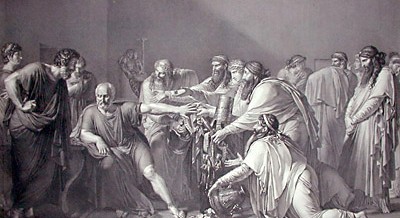
Hippocrates is widely acclaimed today as the “Father of Medicine”. M.D.s take the Hippocratic Oath when they are about to enter medical practice. We all know the name, but who was the man?
Hippocrates was a physician born in 460 B.C. on the Greek island of Cos. He had an investigative mind and disproved the common beliefs of the day – despite strong opposition from the governing authorities who sentenced him, as a young man, to 20 years in prison. Rejecting superstition, religion, and magic, he taught that disease is caused by transgression of the laws of Nature, that medicine can only be practiced scientifically, based on facts, observation and study. Believing that the body must be treated as a whole and not just a series of parts, he was the first physician to use diet, fresh air, medicinal waters, herbs and exercise in the treatment of disease – and with outstanding success.
Hippocrates accurately described disease symptoms and was the first physician to catalogue the symptoms of pneumonia, as well as epilepsy in children. He was the first to categorize illnesses as acute, chronic, endemic or epidemic, noting that there were individual differences in the severity of disease symptoms and that some individuals were better able to cope with their condition than others. He was also the first physician to hold the belief that thoughts, ideas, and feelings come from the brain and not the heart as others of his time believed.
After years traveling throughout Greece treating the full range of human ailments, Hippocrates founded a medical school on Cos to teach his ideas. This revolutionized medicine in the ancient world, establishing it as a discipline, a respected profession, apart from fields like philosophy or religion that it had traditionally been associated with.
He compiled a list of 400 herbs that he found curative, half of which are still used by herbalists today. Regarding medicine as an art that must be practiced with the utmost integrity and openness to new ideas, he developed an Oath of Medical Ethics for physicians to follow. Today a modernized version of the Hippocratic Oath is administered in the graduating ceremonies of most Western medical schools, serving as an ethical guide to the professional life of the medical doctor.
Though Hippocrates is honored as the “Father of Medicine,” if he were living today, no doubt he would be labeled a Naturopath, and, most likely, he would be disregarded or limited in his work by those who now claim him as their patron saint and swear to the oath that bares his name.
Hippocrates, in his own words:
- Everyone has a doctor in him or her; we just have to help it in its work. The natural healing force within each one of us is the greatest force in getting well. Our food should be our medicine. Our medicine should be our food.
- Any man who is intelligent must, on considering that health is of the utmost value to human beings, have the personal understanding necessary to help himself in diseases, and be able to understand and to judge what physicians say and what they administer to his body, being versed in each of these matters to a degree reasonable for a layman.
- If we could give every individual the right amount of nourishment and exercise, not too little and not too much, we would have found the safest way to health.
- It is more important to know what sort of person has a disease than to know what sort of disease a person has.
- That which is used – develops. That which is not used wastes away.
- About medications that are drunk or applied to wounds, it is worth learning from everyone; for people do not discover these by reasoning but by chance, and experts not more than laymen.
- A wise man should consider that health is the greatest of human blessings, and learn how by his own thought to derive benefit from his illnesses.
- Through seven figures come sensations for a man; there is hearing for sounds, sight for the visible, nostril for smell, tongue for pleasant or unpleasant tastes, mouth for speech, body for touch, passages outwards and inwards for hot or cold breath. Through these come knowledge or lack of it.
Original article from http://www.rethinkingcancer.org/
JUL





